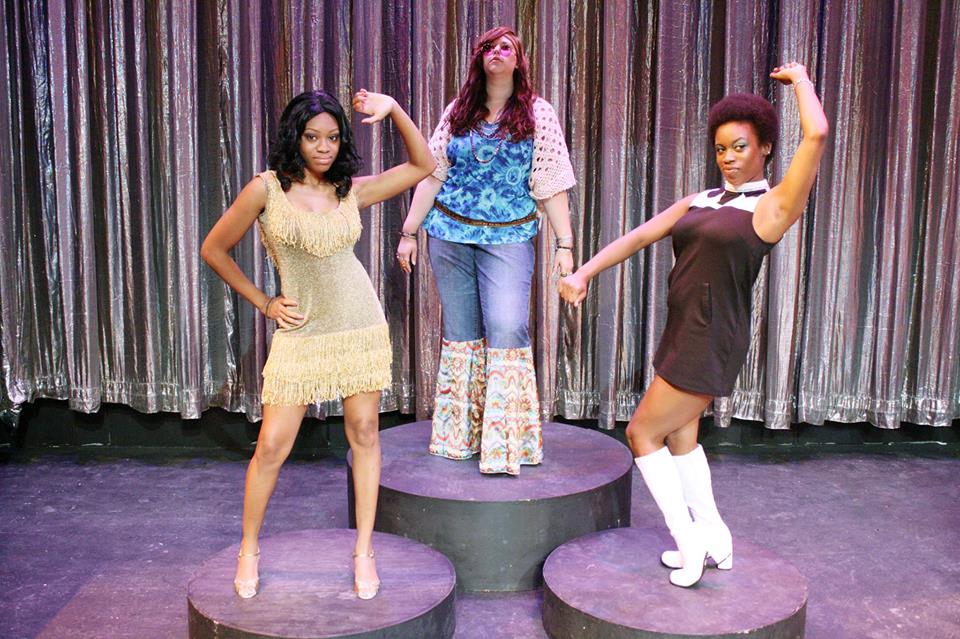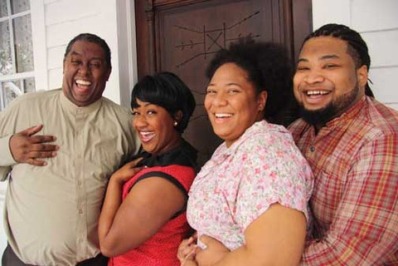There are plenty of good reasons why Beehive - the 60's Musical has been brought back to the Workshop Theatre stage after a successful run fifteen years ago, and eight of them light up the performance with stunning vocals and infectious energy. Jocelyn Sanders and Daniel Gainey provide expert direction that shapes a fluid journey through 1960’s music, as the eight performers celebrate female singers and songwriters. While the first act presents a vivacious stroll through girl groups of the early sixties, the second half of the show really rocks the house with the rough, raw sounds of Tina Turner, Aretha Franklin, and Janis Joplin. Medleys combine excerpts of familiar favorites through fictional characters, as in the extended party sequence that features “It’s My Party,” “I’m Sorry,” “You Don’t Own Me,” and “Judy’s Turn to Cry,” among others.

The Beehive ladies excel at inviting the audience into their world, as the performers handle the audience participation segments with friendly enthusiasm. Valdina Hall, a consummate musical theatre performer and a cast member in the first Beehive production at Workshop, launches the show with confidence. Her warmth and magnetism permeate the occasions when she addresses the audience directly, one of the show’s many strengths. (I enjoyed the good fortune of attending Beehive as the middle member of three generations of girls who love to sing. My mother observed, “When Valdina is on stage, you just feel like everything is going to be all right.”) Jordan Harper’s exquisite yearning and soaring vocals illuminate “Where the Boys Are” and “To Sir With Love,” while Tameshia Magwood thrills with her stirring rendition of “Proud Mary.” Devin Anderson is a true powerhouse who fires up the stage in “One Fine Day,” “Will You Still Love Me Tomorrow” and “Respect.” The rest of the cast (Rayana Briggs, Roxanne Livingston, Brandi Smith, and Safiya Whitehead) brings versatile talent to a slew of musical numbers; the directors deserve commendation for insightful pairings of singers with songs.
The design team makes cohesive choices that support the production with efficiency and purpose. Randy Strange’s scenic design features dynamic visuals and useful levels, while Barry Sparks provides masterful lighting design. The placement of the excellent band onstage proves valuable, as the music (directed by Roland Haynes, Jr.) is front and center throughout the performance. The band’s presence also enables energizing interaction with the performers. Singers and musicians benefit from Baxter Engle’s effective sound design. Choreography by Barbara Howse-Diemer evokes the girl groups of the sixties, evolving through different movement styles as the decade progresses. Costume designer Alexis Doktor provides visual evidence of the decade’s social changes as the performers replace pastel florals with psychedelic miniskirts. Expectation of impressive wigs and hairstyles comes with the territory in a show called Beehive, and this production does not disappoint. Bobby Craft’s expertise as stage manager keeps the energetic show running smoothly. Design elements work very well together; the lighting and choreography establish a definite shift in tone with “The Beat Goes On.” A few issues with clarity of spoken dialogue over band accompaniment early in the show and a couple of awkward transitions are minor quibbles in light of Beehive’s audience-pleasing power. My young daughter proclaimed upon leaving the theatre, “That was a great show!”
Beehive at Workshop Theatre delivers an entertaining showcase of 1960’s music through the considerable talents of eight versatile and hard-working performers. Beehive earned great buzz from responsive audiences on opening weekend and deserves to pack the house with sixties music lovers through the remaining performances. Be assured that this production is not a series of imitations of the original singers. These Beehive performers make unique contributions to create something that is at once both nostalgic and new.
Beehive the 60's Musical continues at Workshop Theatre through Saturday, September 28, with curtain at 8 PM, except for a 3:00 PM Sunday matinee on September 22. Contact the Workshop Theatre Box Office at 803-799-4876 for ticket information, or visit www.workshoptheatre.com.
~ Melissa Swick Ellington
........................................................
Jasper welcomes a new critic to our theatre team. Melissa Swick Ellington earned a Ph.D. in Educational Theatre from New York University. She has directed or performed in numerous productions in professional, community, and educational theatres in New York and South Carolina. She taught theatre in K-12 and university settings for over a dozen years.


